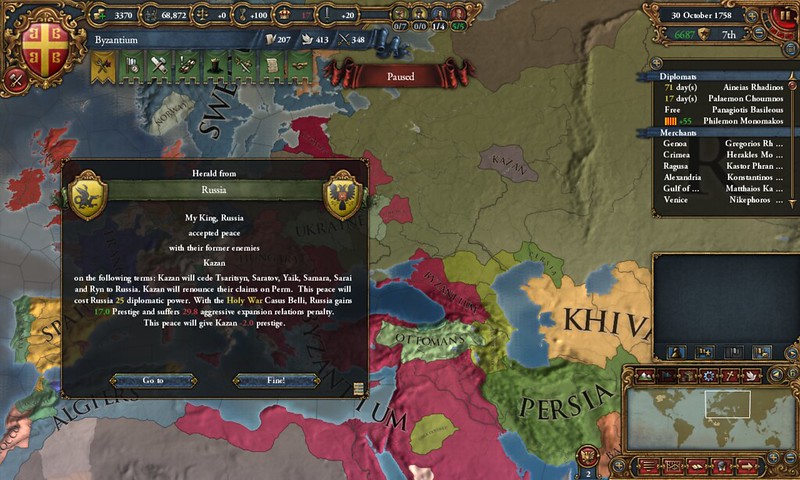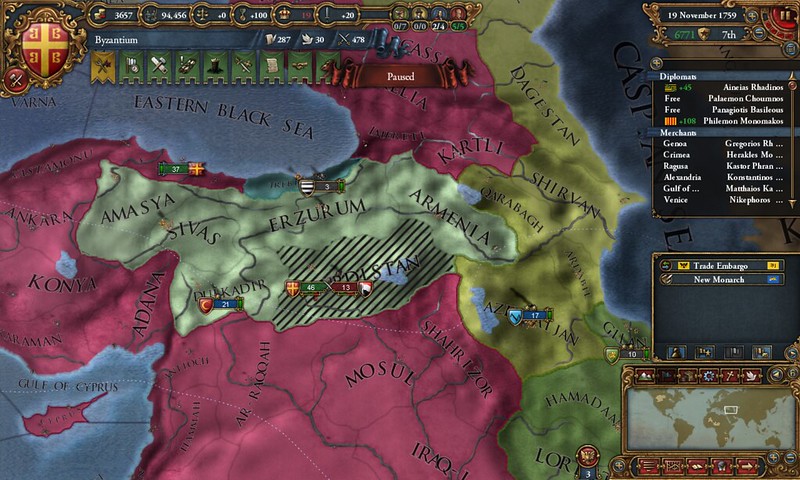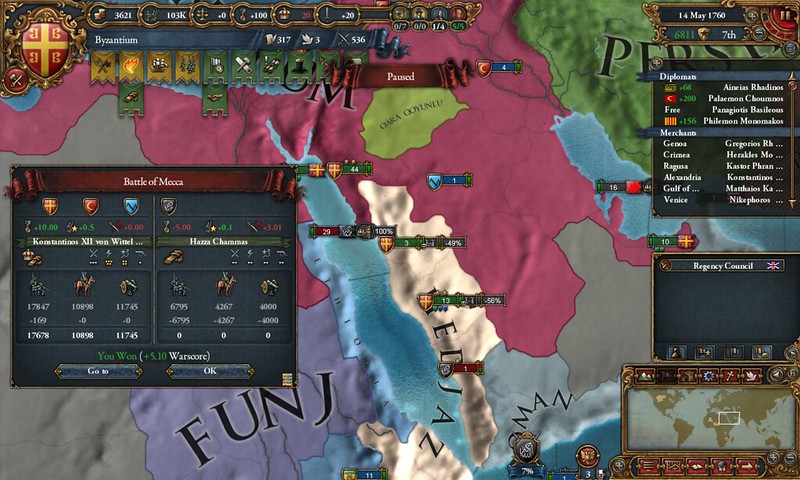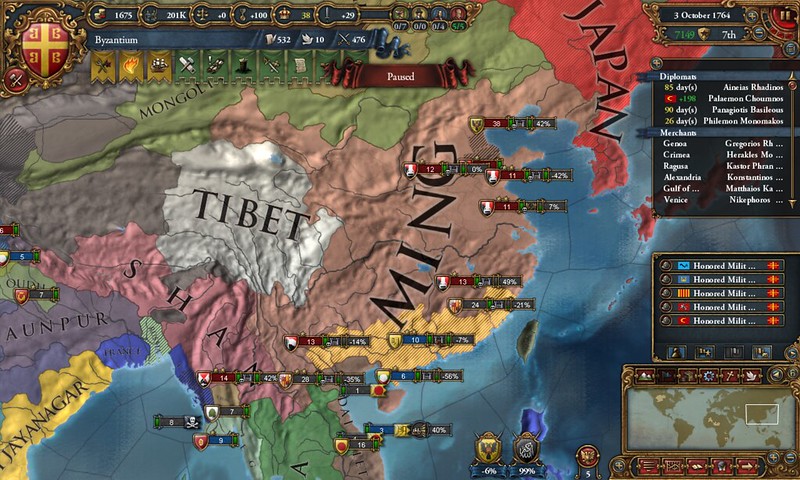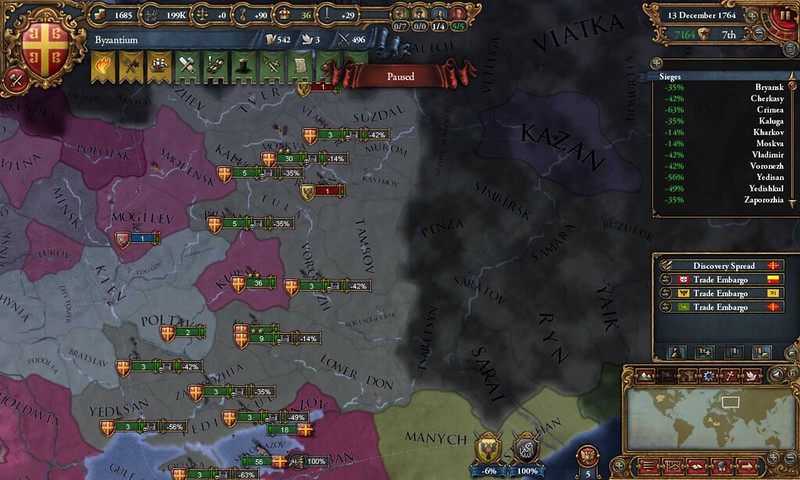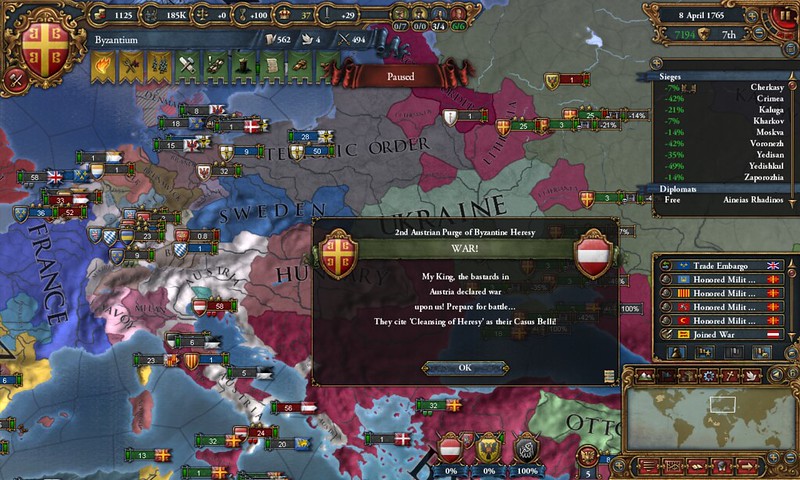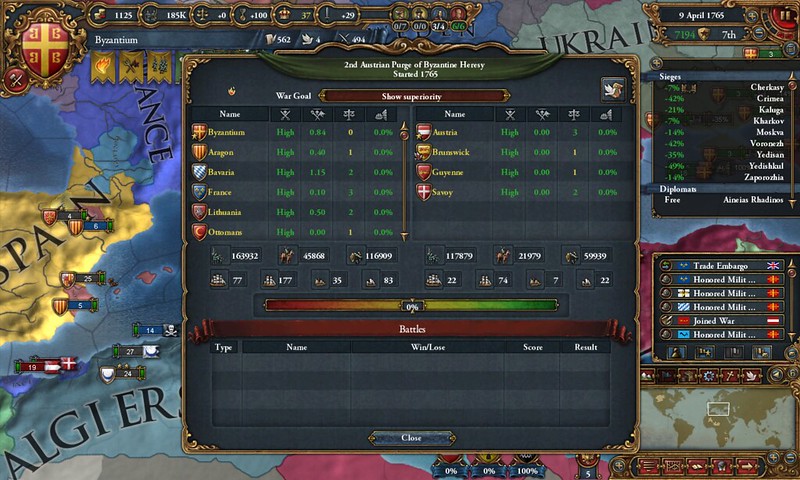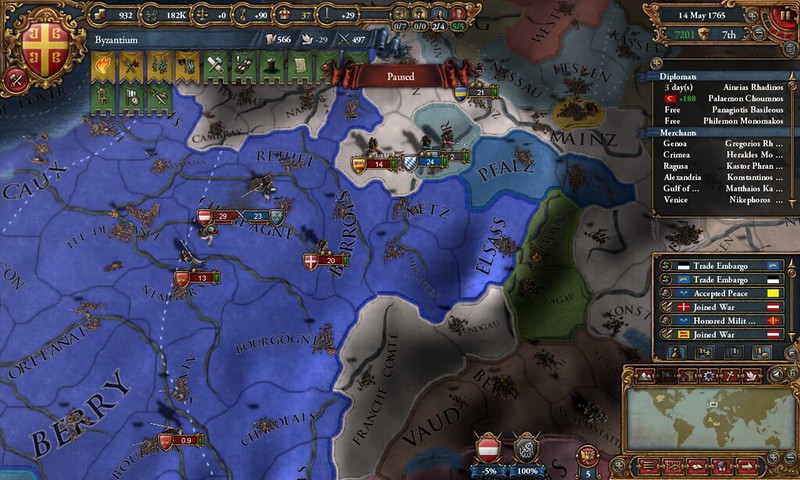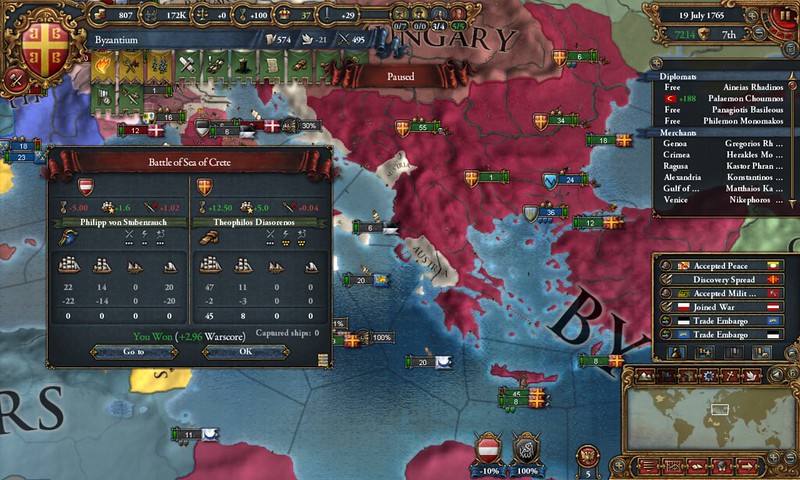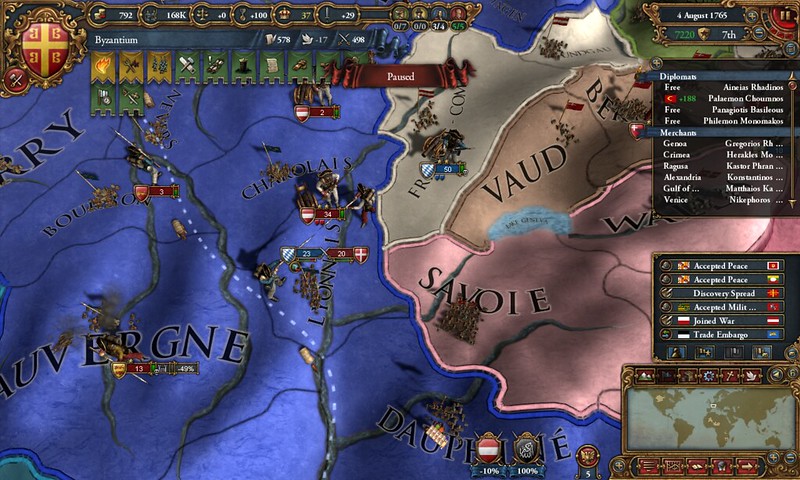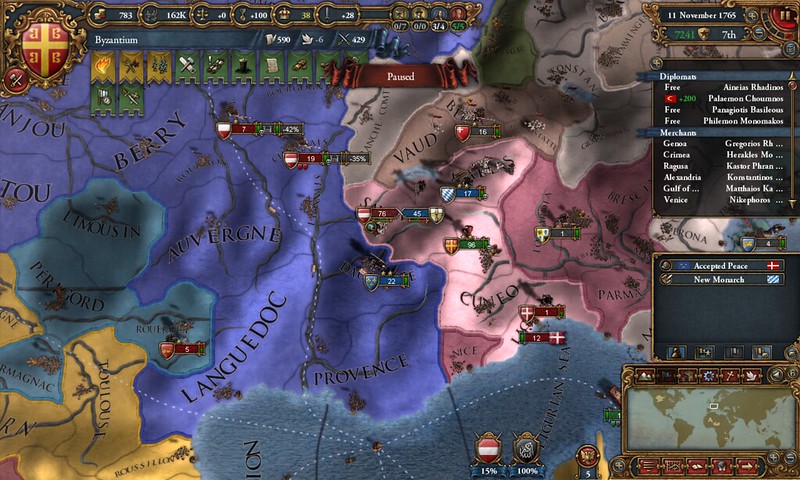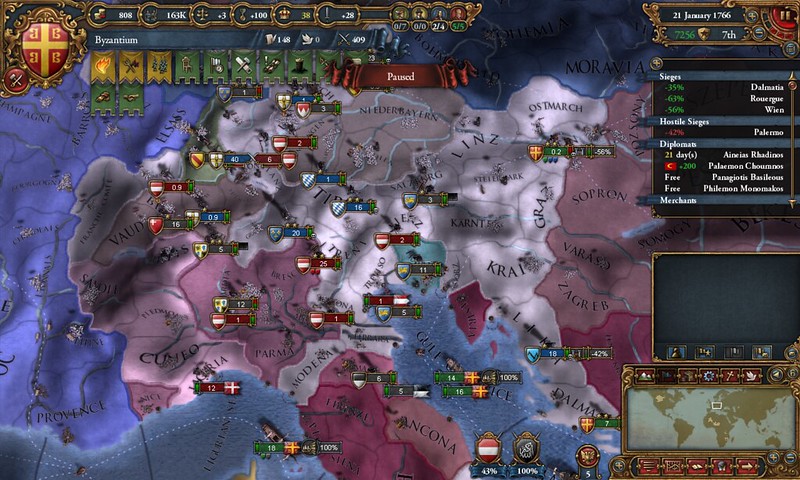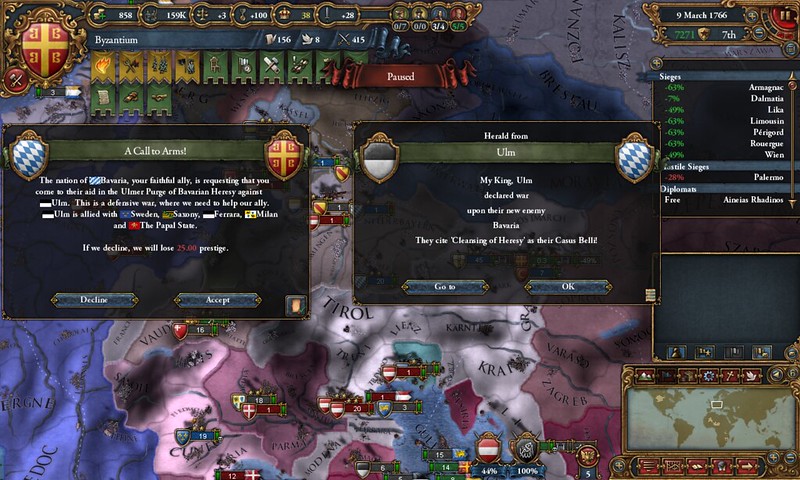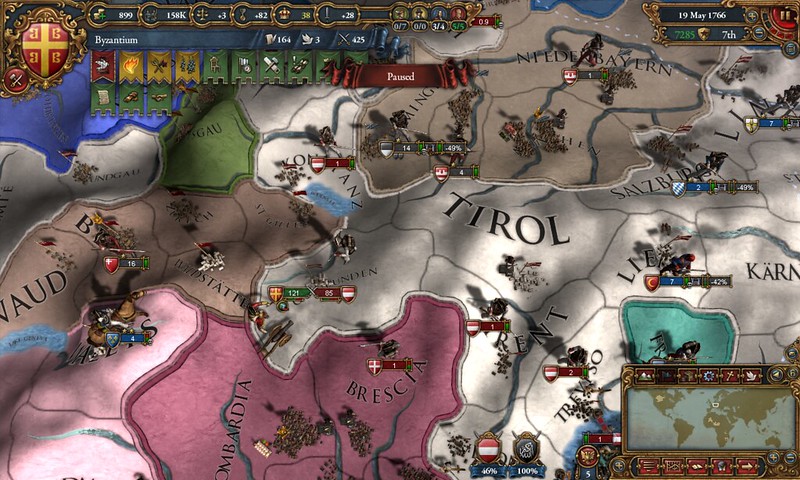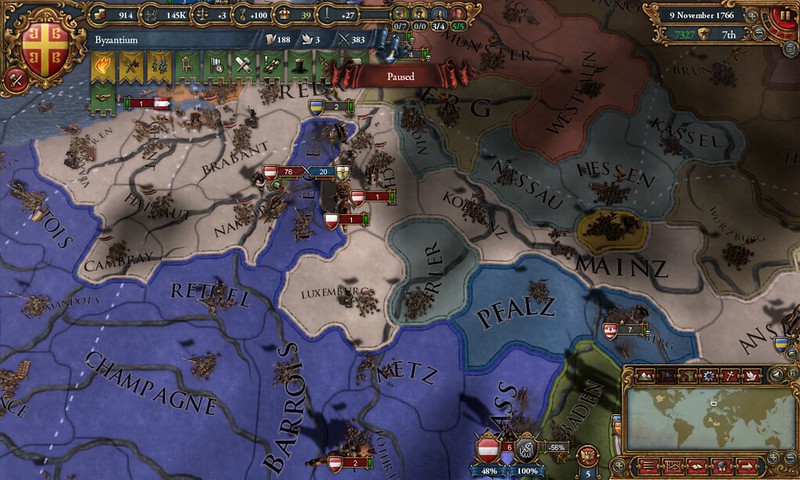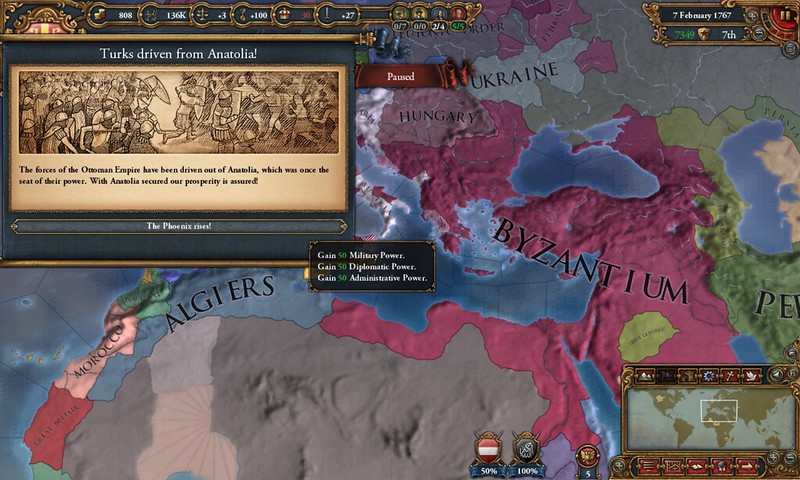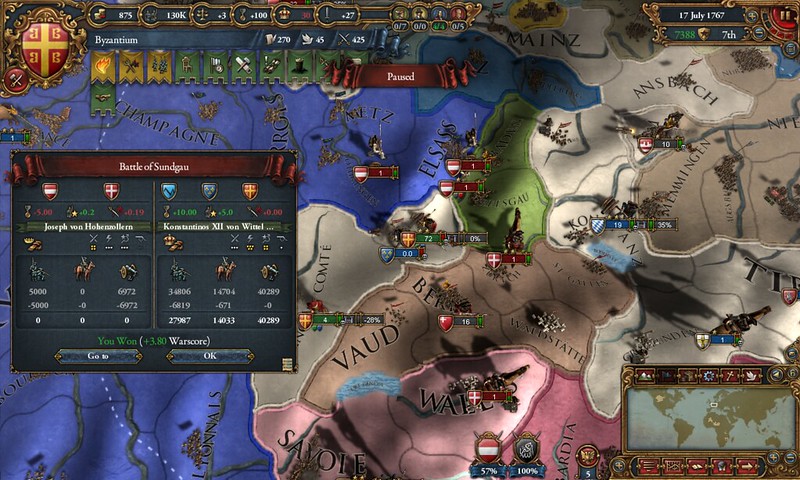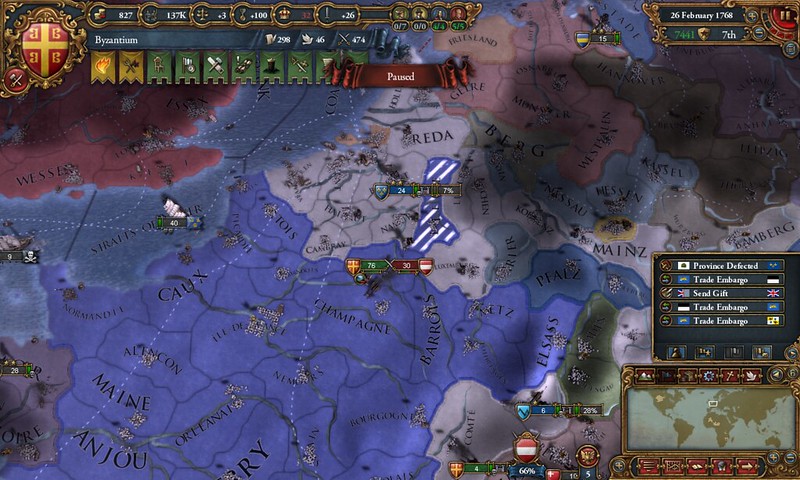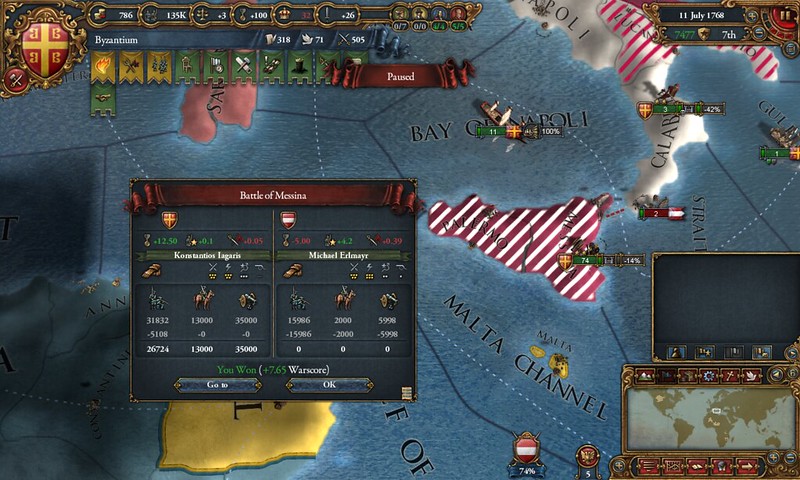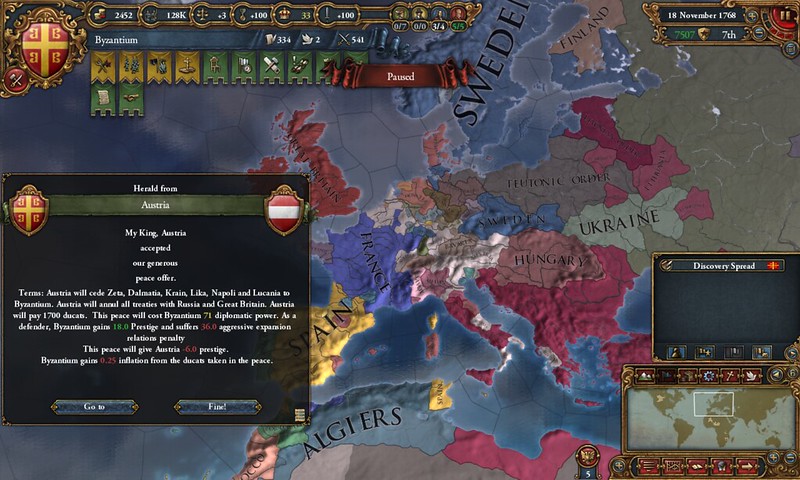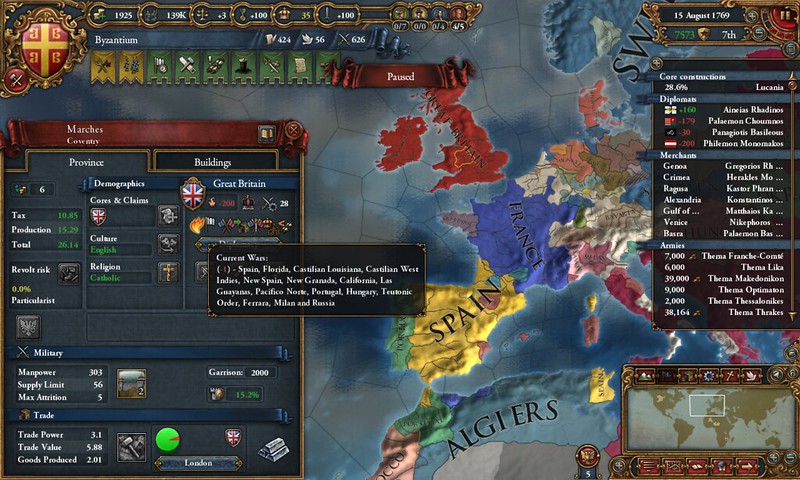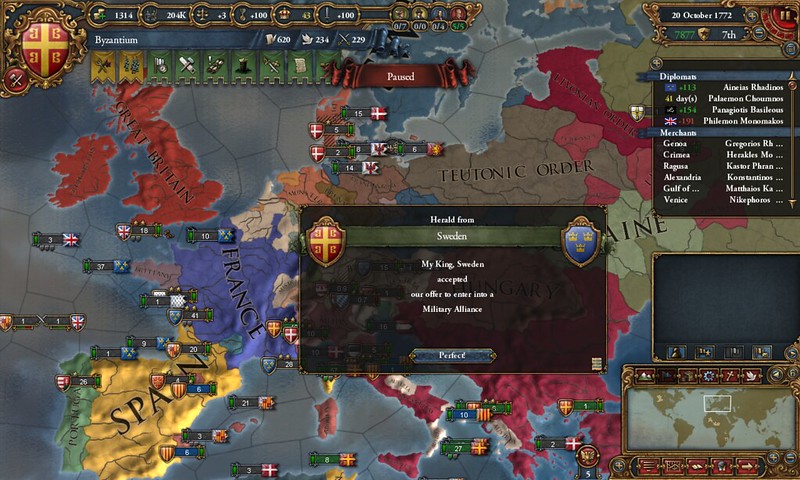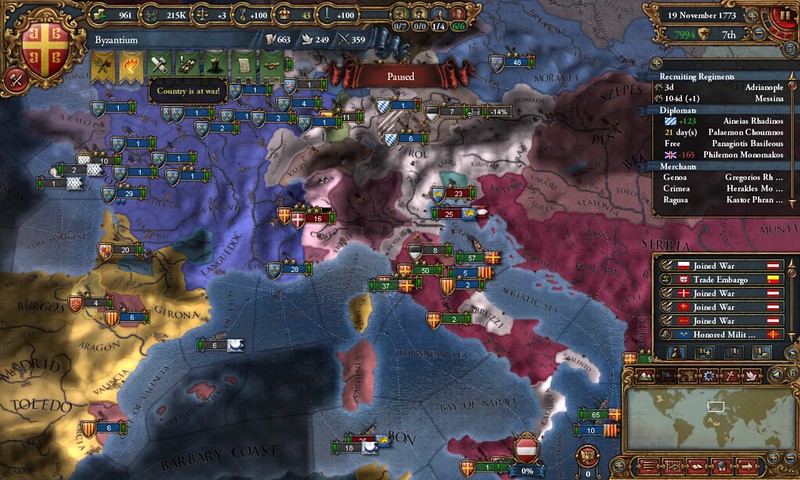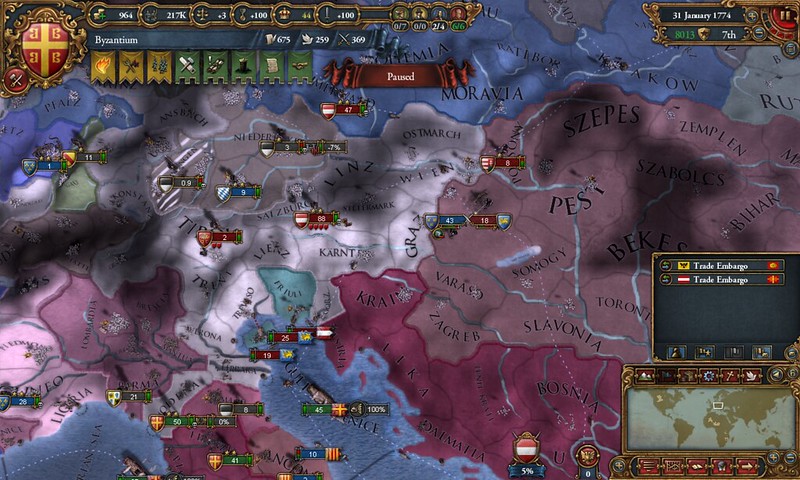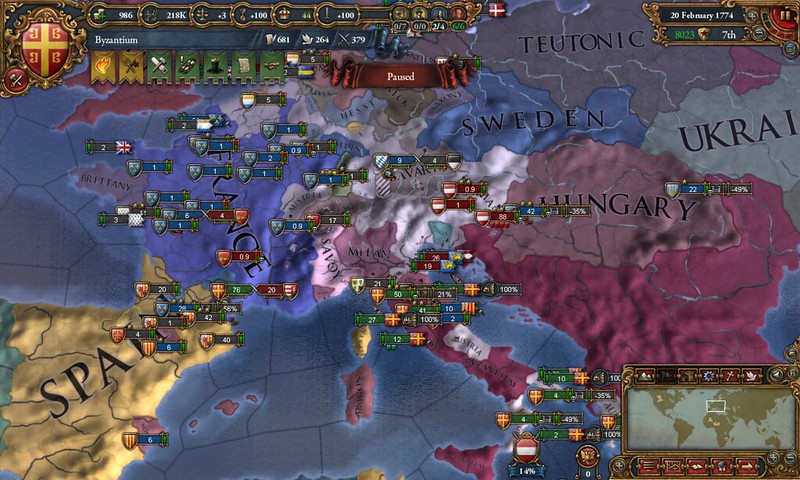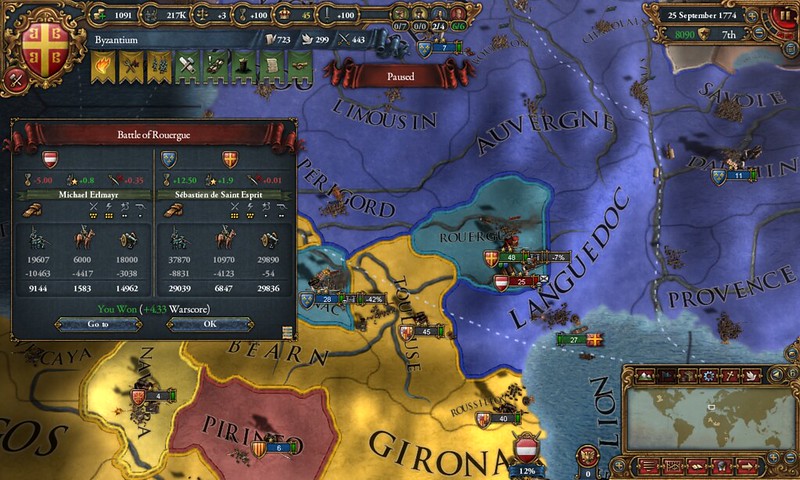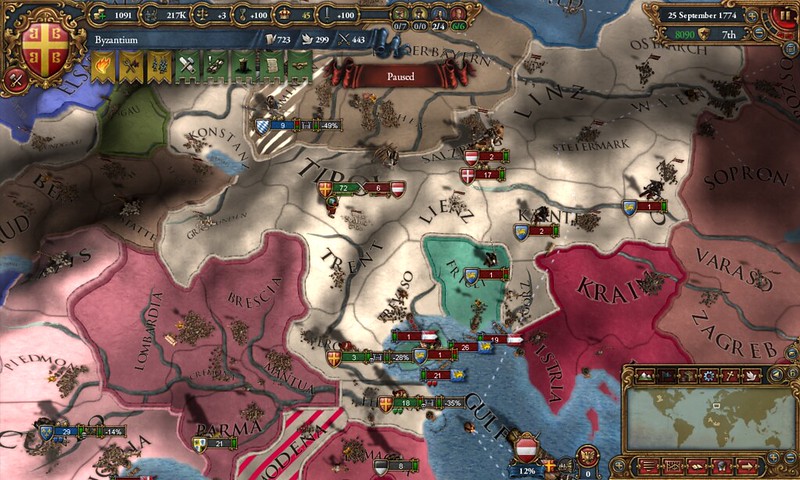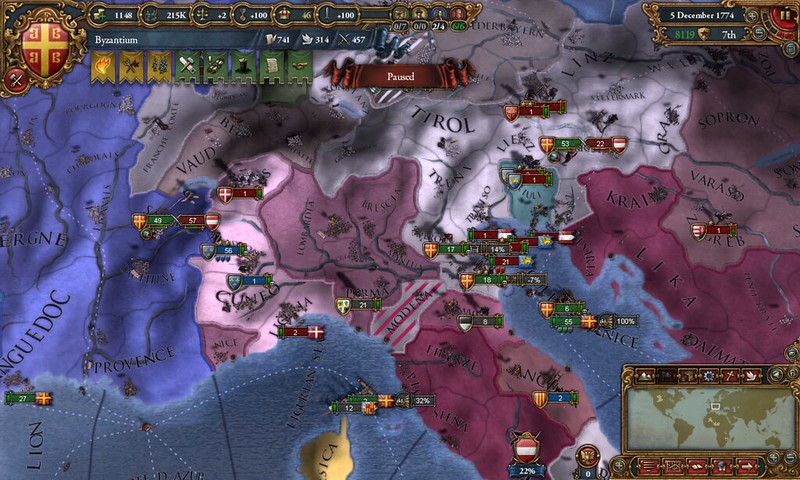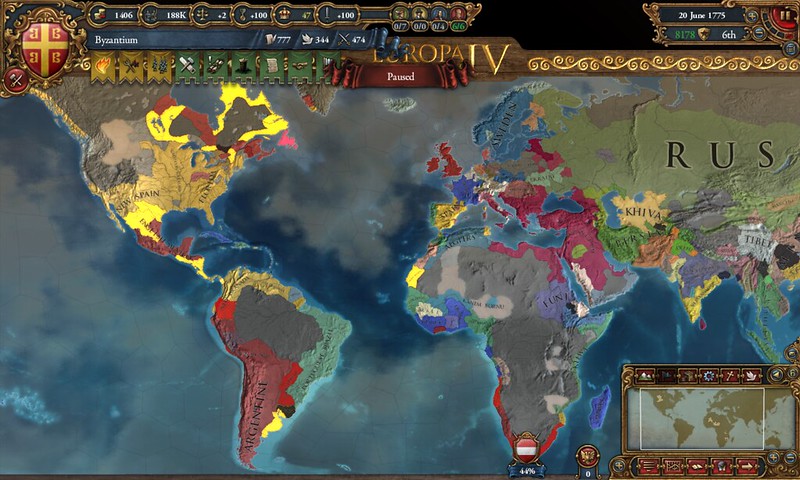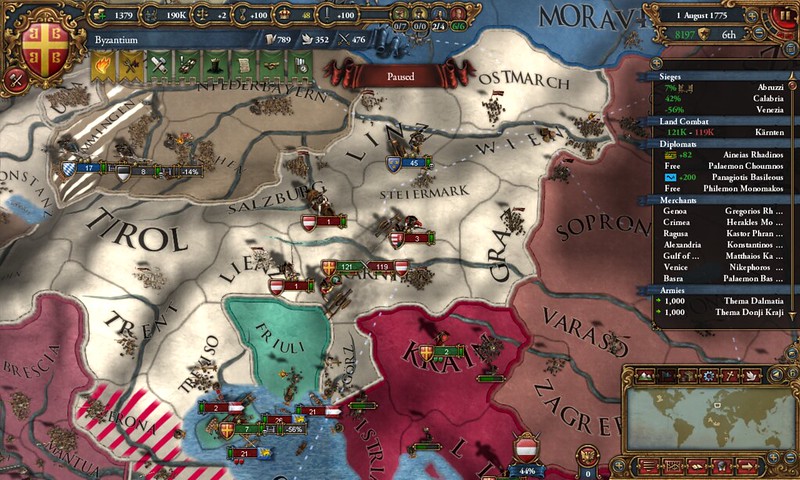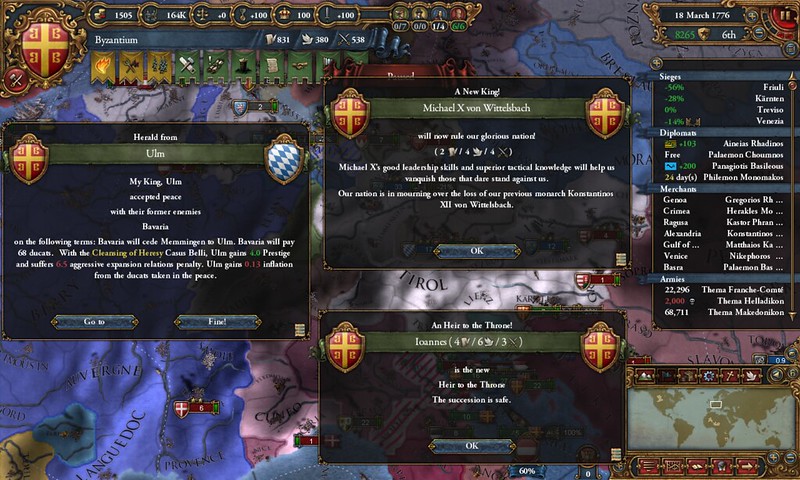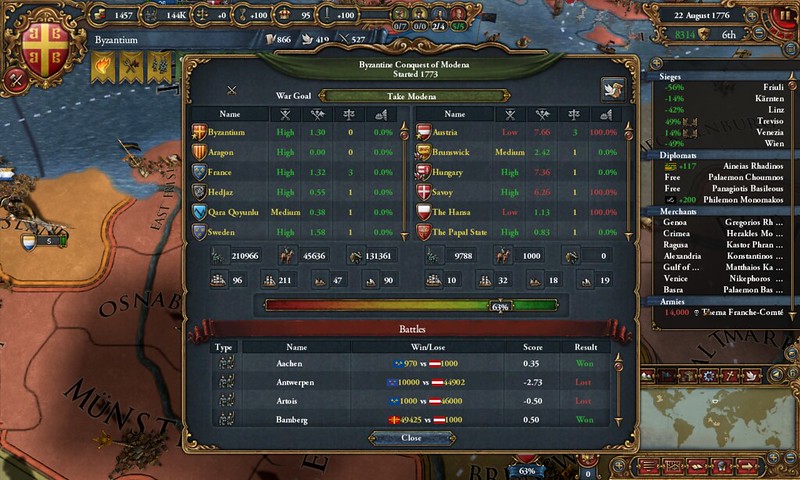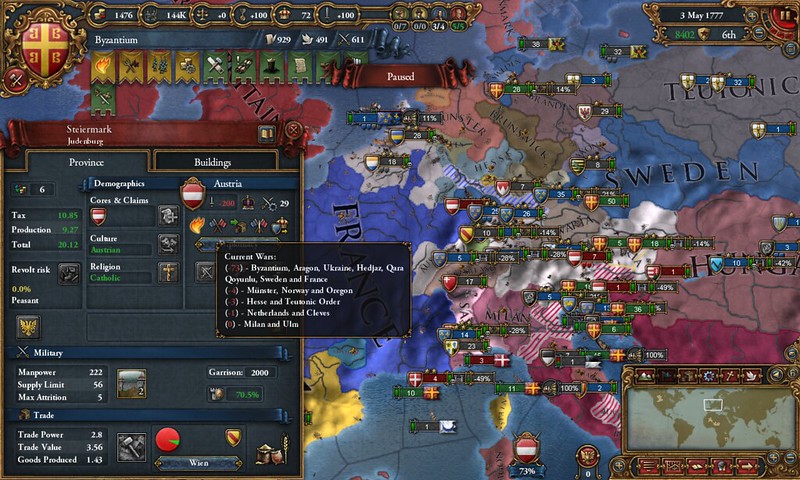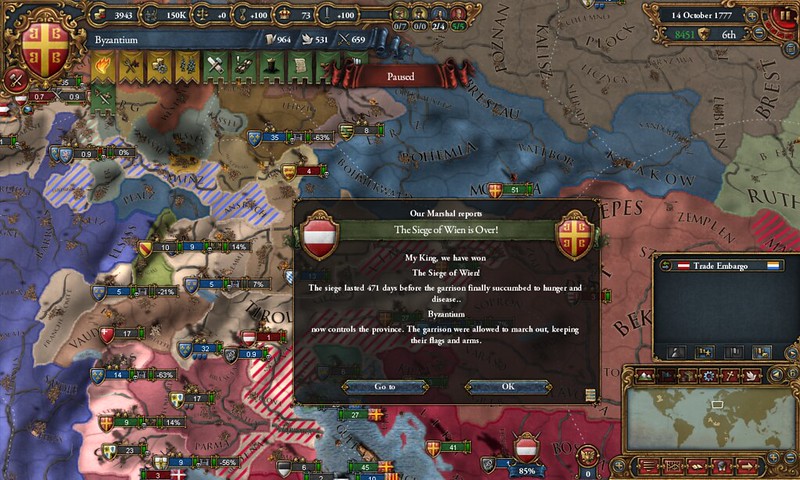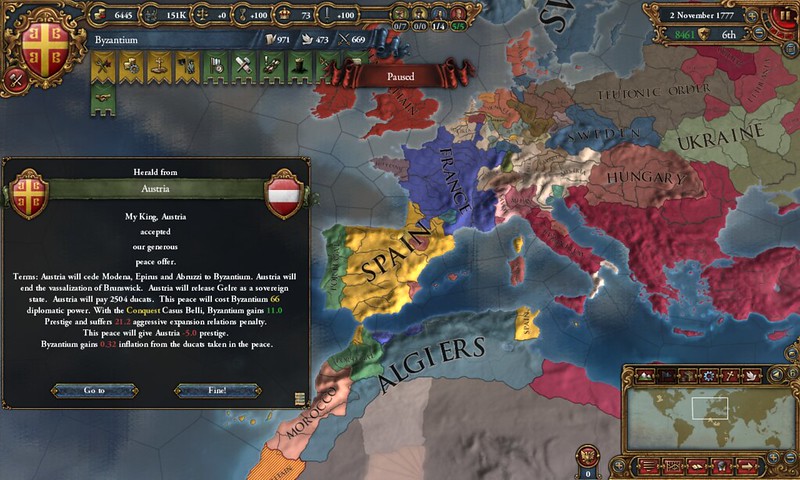Well that was silly. When fighting a war against huge opposition with small chances of victory, swallowing some loss of prestige is very wise.
Cranky Spartans - Byzantine AAR
- Thread starter macd21
- Start date
-
We have updated our Community Code of Conduct. Please read through the new rules for the forum that are an integral part of Paradox Interactive’s User Agreement.
You are using an out of date browser. It may not display this or other websites correctly.
You should upgrade or use an alternative browser.
You should upgrade or use an alternative browser.
Well that was silly. When fighting a war against huge opposition with small chances of victory, swallowing some loss of prestige is very wise.
Yeah I know, but I was having having such an easy time of it initially that I grew overconfident. The Austrians had suffered horrendous casualties and were on the run. Had I won that battle I would have been able to force them to return a few provinces or (more likely) give up their alliance with Russia (and maybe even Great Britain). That last battle was very, very close. Had the French thrown in a few more regiments, it would have gone our way. Ah well. You live and you learn...
That was really unlucky that you didn't win that battle. By the way why have you assimilated the Balkans, but not Asia Minor? It could be to your advantage now though if Austria gets weak, since many of the provinces you lost would be able to spawn patriots---so just let them alone in the next war and wait for rebels.
That was really unlucky that you didn't win that battle. By the way why have you assimilated the Balkans, but not Asia Minor? It could be to your advantage now though if Austria gets weak, since many of the provinces you lost would be able to spawn patriots---so just let them alone in the next war and wait for rebels.
I changed the culture of the Balkans in the early days, before I westernised. At the time I was happy to keep my dip tech low, as I needed to let a western neighbour get 8 tech levels ahead. As such I had plenty of points to spend on culture shifting my provinces (and the Balkans were my earliest conquests). Then I westernised and I didn't have any monarch points to spare. I haven't changed any province culture's since then.
Chapter 35: Feint Right, Punch Left
The next few years were fairly quiet, as the Empire rebuilt its military. A Russian invasion of Kazan prompted the Emperor to launch an attack of his own, quickly extending our borders north before withdrawing. The Russians soon consumed the rest of the country, leaving the Kazans with a single province, surrounded by Russian territory.
Poland was annexed by Sweden, strengthening their position in Central Europe. The Spanish were currently at war with the Ming. Meanwhile, I saw an opportunity closer to home.
My Ottoman vassals were having some trouble in Kurdistan. After I slaughtered the rebels, the Turks were so happy with me that they finally agreed to annexation! The integration process began...
And here's where I made a rather silly mistake. Still getting used to some of the changes from 1.6, I forgot that annexing a vassal now drains diplomatic points over time. This would both delay the integration of the Ottomans and have some other unfortunate effects. For example...
...my war with Hedjaz. I decided to consolidate my position in the south a bit and easily crushed the enemy army. Their Arabian provinces soon fell, and my vassals moved to take their provinces on the other side of the Red Sea. It was at this point that I realised what had happened. I didn't have the diplomatic points to make peace.
Oh well. I decided to just wait it out, eat the war exhaustion and deal with any rebels that popped up. And as I was at war anyway, I decided to quickly snap up Trebizond, which went off without a hitch. But now, time for another gamble...
The Russians had decided to take advantage of the Spanish war with the Ming to launch an invasion of their own. The Ming were in no shape to stop them - in addition to fighting the Spanish, they were also in the middle of a civil war. I befriended the harried Ming Emperor and then demanded the Russians withdrew their forces. When they refused, my troops swarmed across the border, quickly marching on Moscow.
An Russian counter-attack was driven off... and then their allies decided to intervene.
Austria had declared war yet again. Of course, I'd been half-hoping they'd do just that...
I surrendered to the Russians, releasing Lithuania from vassalage and parting with a small amount of gold. With that distraction removed, I could focus on the Austrians. This time they only had Guyenne, Savoy and Brunswick to help them.
The first battle of the war was fought in Messina, where a small force I had raised there was wiped out by the Austrian army. Unfortunately for the Austrians, however, I was able to then trap them on the island, robbing them of a decent fraction of their total strength.
While I rushed to redeploy my forces, the Austrians launched an attack against the French. 50,000 Austrians hit 35,000 Frenchmen in Champagne. Reinforcements streamed into the battle for both sides. Despite being heavily outnumbered, the French put up a good fight, almost winning despite the odds. A large Bavarian army was just a few days late - had they arrived on time, the Austrians would have suffered a humiliating defeat. As it was, however, things in France looked desperate.
My fleet, meanwhile, established control of the Mediterranean, smashing the Austrian navy in a series of engagements. My trade would flow freely across the sea, my transports would give me strategic flexibility and my warships would blockade the enemy's ports.
Back in France, another crucial battle would be fought in Lyonnaise. Once again reinforcements streamed into the conflict, but this time it would be my allies who would emerge victorious, crippling the enemy armies and scattering them in every direction. My own forces then arrived in the south of France, quickly obliterating the Savoyard army and reinforcing the French. And none too soon...
An Austrian counter-attack caught the Teutons by surprise in northern Savoy, but the arrival of Greek, French and Bavarian troops turned the tables on the enemy. General Mathias Poll suddenly found himself out numbered almost 3 to 1. 40,000 men were either killed or captured, while our forces only lost 10,000. While we were fighting in Savoy, a Ukrainian attack on Wien defeated an Austrian army sent to relieve the city. Reinforced with Ottoman and Greek troops, the Ukrainians likewise fought off a Brunswick assault on the siege lines.
The fighting continued. Guyenne's army was destroyed and I left an occupation force in place to lay siege to their cities. Messina fell to the enemy, who moved on to take the rest of Sicily. Our forces engaged the Austrians outside of Naples, suffering surprisingly heavy casualties before driving them north. Despite our losses, however, the momentum seemed to be on our side, as our forces hunted the enemy throughout central Austria.
Unfortunately, Ulm then decided to launch an invasion of Bavaria. While we were currently winning the war with Austria, the enemy still had significant forces and adding Ulm and her allies into the mix could tip the balance against us, so I reluctantly refused the call to arms. Our Bavarian cousins were in trouble - in addition to Ulm and Austria, they were also fighting with Cleves and their allies. Altogether, they were now at war with Austria, Brunswick, Savoy, Guyenne, Cleves, the Netherlands, Baden, Wurzberg, the Papal State, Sweden, Saxony, Ferrara and Milan.
I'm sure they'll do just fine. And though this technically ended our alliance, the Bavarians immediately asked to renew it - they clearly realised they needed all the friends they could get.
The most critical battle of the war would be fought in the Alps, at the Battle of Graubünden. Both sides suffered terrible casualties, each losing almost 50,000 men, but in the end the Austrians were forces to pull back, fleeing north. We could now dominate eastern and southern Austria, while they tried to recover in the lowlands. Unfortunately our Teuton allies (always a rather aggressive bunch) chose to pursue the enemy, without any support from the rest of our forces.
This did not end well for our allies. The Austrian's joy was short lived, however. Having defeated the Teutons, they then struck at the French in Baden, but my army arrived in time to drive into the enemy's flank. The Austrians were crushed, ending any chance they might have had to counter our advance.
And then, finally...
Well, nice to finally have that out of the way. I quickly restored the theme system, then got back to killing Austrians. I soon began wrapping up the war. Guyenne ceded two provinces to France, freeing up more troops to besiege Austrian provinces. A peace settlement was finally reached with Hedjaz - they were now our vassal. I then began to systematically hunt down and destroy every single Austrian army of note.
After the destruction of their forces in Sicily, the Austrians had no more than six intact regiments and less than 7,000 manpower in reserve. I figured that was enough damage for now, so I end the war. First I forced Savoy to return a province to France, then sent my terms to Austria.
I felt suitably avenged. Epirus was still in Austrian hands, but I had taken Lucania in exchange. And of course, I had no intention of letting the Austrians hold it for long...
- 1
Well played tricking the Austrians to declare war on you. Do you have a chance to revassalise Lithuania?
I may be misremembering, but doesn't annexation also cost diplomacy points? In that case how did you get enough to annex Trebizond?
I may be misremembering, but doesn't annexation also cost diplomacy points? In that case how did you get enough to annex Trebizond?
Well played tricking the Austrians to declare war on you. Do you have a chance to revassalise Lithuania?
I may be misremembering, but doesn't annexation also cost diplomacy points? In that case how did you get enough to annex Trebizond?
I could probably, with a little effort, revassalize them, but to be honest I have enough vassals as it is. I might snap them up later, once I've integrated a few of the others.
Trebizond was a core, so as a reconquest it didn't cost any dip points to take.
Holy.
Wut.
Reformed France?
Yep. The Reformation didn't really take all that much, yet the Reformed faith actually managed to convert a decent power. Only for that power to perform unusually poorly (I'm not sure France would still exist if it we weren't allies). I love how this game throws up surprises like that.
Thus concludes WW2 in 1768.
Nah, this was more of a little European squabble
Yet another war with Austria had come to an end. Our victory prompted the Austrians and Hungarians to enter into a coalition against us, but thankfully no one else joined them. While our forces dealt with some Kurdish rebels in the east, news reached us of a terrible conflict to the west. The union of Portugal and Spain had triggered a war with Great Britain. The Anglo-Iberian Succession war would consume much of Europe and the New World for years to come. I considered using this distraction to launch my own attack against Spain, stripping a few provinces from them and returning others to Aragon, but I decided to hold off. The Succession War would be mostly fought at sea, leaving Spain itself heavily defended. The French would be of little help for some time, leaving me to fight the entire Spanish and Portuguese armies mostly by myself. While I might be able to overcome their forces (though even that was not guaranteed), it would be costly and time consuming. It would also leave us vulnerable to attacks from Austria and Russia.
France's continued weakness convinced me I needed to look for additional allies. While the Teutons packed a nice punch, they only fielded about 50,000 troops, while the Bavarians only had about 20,000. Unfortunately most of the other Great Powers were either my rivals, or saw me as a competitor in the Far East (they wanted my provinces). There was one other power, however, who possessed a strong military and harbored no colonial ambitions. And, somewhat to my surprise, didn't throw my diplomats out on their asses upon arrival...
While we had gone to war with the Swedes many times, they were willing to overlook this due to our mutual rivalry with both Austria and Russia. This did put us in the awkward position of being allies with both Sweden and the Teutons, which would almost inevitably cause problems later on. For now, however, we could call upon Sweden's 100,000 elite troops, should anyone attack us.
The ceasefire with Austria finally came to an end. They had rebuilt much of their army, but were still below full strength, and their manpower reserves were fairly low. They lacked powerful allies to protect them. Now was the time to hit them - every month that passed would only allow them to increase their strength.
Sweden and France were willing to assist me (unfortunately the Teutons were embroiled in the Succession War). My forces were deployed in three armies - two in northern Italy, the third in the south of France. The 3rd army would support the French, harrying Austriia's allies in Guyenne and Savoy and hopefully keeping the French army from being wiped out. The 1st and 2nd armies would provide mutual support. If necessary, the 3rd army could be redeployed to Italy on transport ships (or vice versa).
This strategy did leave the Swedes to fend for themselves, but to be honest I didn't really care. At this point I mostly just saw them as cannon fodder rather than viable long term allies. Even if they were wiped out, the Austrians would suffer casualties, and the Austrians couldn't afford to fight a war of attrition.
In addition to Austria, I was opposed by their coalition partner Hungary, their allies Guyenne, Savoy, the Hansa and the Papal State, and their vassal Brunswick. Venice, as Defender of the Catholic Faith, also answered their call to arms. Though none of these could be described as a major power, together they added tens of thousands of troops. Venice alone had over twenty thousand. Even so...
...they were terribly outnumbered. Now, if I could just take out a few of their larger stacks, the war would be won.
The first few months of the war saw little action, as the enemy tried to avoid engagement with our larger forces. The Swedes finally caught up to the Venetian army, however, quickly routing the smaller force. Unfortunately the Swedes were then hit by the Austrian army, which outnumbered them 2 to 1. The Swedes were defeated and the enemy quickly moved on to crush the Ukrainian and Qara Qoyunlu armies attacking Hungary. While this cost me valuable war score, I wasn't too bothered (certainly not enough to lend my allies or vassals any assistance). I could afford to let my allies throw away troops like this, as long as they took some Austrians out with them. In the meantime, I deployed small forces to lay siege to Epirus and southern Italy, while the 2nd army lay siege to Modena and the 3rd army helped the French destroy the Hungarian army (which had been deployed to Spain to assist in the Anglo-Iberian Succession War).
There was another stalemate for a few months, as our forces continued their sieges, while the Austrians held back their troops. Eventually, however, the enemy launched an expedition to relieve Guyenne. The 3rd army moved to reinforce the French position and the Austrians were driven back, with heavy casualties.
Having overextended themselves in their attempt to save Guyenne, the Austrians were now vulnerable to an attack from the south. The fall of Modena freed up the 1st and 2nd armies, which combined their forces and proceeded to slaughter the small Austrian, Savoyard and Venetian armies hiding in the Austrian interior.
While the Austrians launched another attack in the west, their retreating army was caught at Kärnten. Both battles ended in victories for our forces. We also landed a small army outside of Venice, laying siege to the city.
The Austrians struggled to regroup, leaving our forces to lay siege to their southern cities unmolested. Meanwhile Guyenne surrendered, returning another province to France.
While our forces clashed in France and Austria, the Anglo-Iberian Succession War continued. The Iberian Armada had destroyed the English Royal Navy, leaving the British colonies vulnerable to invasion. The settlers of Argentine were holding their own, but the armies of Newfoundland and Mexico had been defeated and their provinces fell one by one.
Back on the eastern front, the Austrians had finally managed to regroup and launched a concerted counter-attack. My army met them at Kärnten once more. The battle was close - for a second I thought I might see a repeat of the disastrous Battle of Sundgau, twenty years earlier, but the arrival of 45,000 Swedes tipped the odds decisively in our favour. The combined forces of Austria, Hungary, Brunswick, the Papal State and Venice had been defeated. The war was effectively won.
Noting that the Bavarians were being crushed by Ulm's invasion, I decided to intervene. Ulm initially rejected my enforce peace demand, but upon realising that their army was about to be completely wiped out, signed a quick peace with the Holy Roman Emperor. Yet there was a far more important development closer to home...
Having a reasonably competent Emperor on the throne was certainly appreciated. And his brother Ioannes represented an even better heir.
The war continued. The Austrians and Hungarians fought a number of desperate battles, trying to catch some of our smaller armies by surprise, but their forces were crushed in one engagement after another.
By August of 1776 the enemy's combined forces amounted to 10,000 troops. The Venetians accepted defeat, agreeing to convert to Orthodox in exchange for the withdrawal of our troops. We continued to take province after province, while hunting down every last regiment the Austrians raised. Vienna continued to hold, but it was only a matter of time before the capital fell.
Seeing Austria's vulnerability, other Imperial member-states began to declare war on them, hoping to retake territories lost to Austrian expansionism. The Papal State surrendered, becoming a French vassal. The Hansa converted to Orthodox and paid me 2500 ducats. And finally...
With that, I was prepared to make peace.
Austria had zero manpower, only three regiments in the field, high war exhaustion and were at war with nine other countries. With luck, the Austrians would lose even more territory to the minor states attacking them, but even if they didn't, they would be busy defending themselves for some time to come. It would be a long recovery.
The Swedish alliance had proven very beneficial. Though they had only committed half of their forces to the war, they had proven highly effective, slaughtering the Venetians and helping us secure victory in a number of clashes. Though I had initially envisaged our alliance as a short-term measure, they had proven their worth. With the French army seemingly incapable of recovering its former strength, it might be a good idea to keep the Swedes happy. Unfortunately, the Teutons would not be pleased...
- 1
That went well.
A fine turnaround you had there!
Yep. Have to say, completely and utterly crushing the Austrians was fun
Some of Magna Graecia was left in enemy hands, why?
Because I have two other provinces to core, freeing Brunswick before they were annexed was more important, and I'm in no hurry.
I'd end the game by getting North Africa, all of Italy and Pannonia back for the Empire.
Ruffling Spanish feathers wouldn't hurt either!
Ruffling Spanish feathers wouldn't hurt either!
The French and Austrians look to have exhausted each other with their incessant wars. The Swedes really helped you out there. After all the wars the two nations have fought, I wouldn't have even approached them for an alliance. All credit to you for spinning the wheel. I suppose fear of the big bad Russian bear is sufficient motivation. The Teutons are having a great time, which is unexpected to see. If you can keep both of them allied to you and not start fighting each other, you'll have a good chance of stomping Austria into the ground and keeping Russia from launching any wars. 'Course that doesn't stop either Sweden or the Teutons DoWing Russia and drag you along for the ride. I can see that happening. I would just love to you get Spain in a personal union.
Don't you have to get Aragon back as a vassal before you can feed them chunk of Spain?
I suspect you haven't finished expanding eastwards, either.
PS I like Italy's white shoes.
Don't you have to get Aragon back as a vassal before you can feed them chunk of Spain?
I suspect you haven't finished expanding eastwards, either.
PS I like Italy's white shoes.


